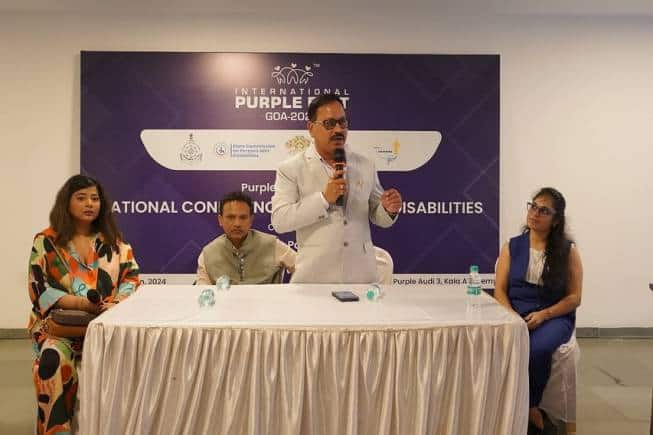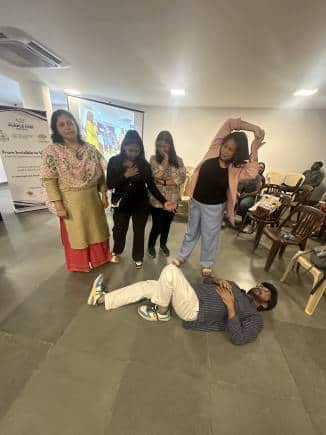



“Visiting every doctor in the vicinity was like a circus,” says renowned filmmaker Mr Vikram Bhatt, who was misdiagnosed with Fibromyalgia. Wherever he went, he was told that it was all in his mind. After 20 years that seemed like an eternity, Mr Bhatt was finally diagnosed with polymyositis, an invisible disability.
Invisible disabilities, as the name suggests, are conditions and illnesses that have no visible markers on the individual's body. For instance, a person with a locomotor disability may use a walking cane or a wheelchair, or an individual with a visual disability may use a white cane, making their disability visible owing to the assistive aids they use. But what about someone who lives with a neurological condition or a pain syndrome, who looks visibly okay but experiences considerable limitations and challenges? Such conditions are known as invisible disabilities and are known to affect more than 10 per cent of all Americans with disabilities. Examples of such conditions fall across a spectrum and range from auditory disabilities; neurodivergence like autism, learning disabilities, ADHD; mental health conditions; autoimmune disorders; neurological disorders and many more.
In India, however, we do not know how many people have invisible disabilities, as they are not a part of the list of disabilities included in the Rights of Persons with Disabilities Act, 2016. Hence, people with these disabling conditions cannot get a disability certificate. In the 2016 Act, three new neurological conditions that are also invisible conditions were added. These were Chronic Neurological Conditions, Parkinson's Disease, and Multiple Sclerosis. Even after their inclusion, patients with these conditions continue to face numerous barriers ranging from late and misdiagnosis, exclusion from education, employment, and healthcare rights, lack of specialists in hospitals, low awareness and sensitization about invisible disabilities and disbelief in the individual's disabilities resulting in discrimination and exclusion.
 (From left) Dr Anubha Mahajan, Shri Guruprasad Pawaskar, Shri Subhash Phal Desai, and Ms Anjali Vyas.
(From left) Dr Anubha Mahajan, Shri Guruprasad Pawaskar, Shri Subhash Phal Desai, and Ms Anjali Vyas.
To counter this, India hosted its first-ever national conference on invisible disabilities named ‘From Invisible to Visible' at the International Purple Fest that took place in Goa in January this year. The Conference was organised by Chronic Pain India in collaboration with the State Commissioner of Persons with Disabilities, Goa, the Ministry of Social Justice and Empowerment and Believe in the Invisible. With the esteemed presence of Mr Guruprasad Pawaskar, State Commissioner for Persons with Disabilities, Goa and Mr Subhash Phal Desai, Minister of Social Welfare, Goa, the conference attempted to start conversations around invisible disabilities.
“Most often, people refuse to believe that there is something known as invisible disability because the condition is not ‘visible’. However, there are days when people like me who look visibly fine are unable to get out of the bed, cannot fulfil basic tasks or deal with excruciating pain all day long! This is why a conference like this was important — to help the masses understand the meaning of invisible disabilities, the difference between visible and invisible conditions and to initiate a conversation on the same,” says Dr Anubha Mahajan, founder and chairperson of Chronic Pain India. Dr Mahajan too has an invisible disability known as Complex Regional Pain Syndrome (CRPS).
The two-day conference had six panel discussions. These were: Journey to Diagnosis and Treatment, Certification and Health Insurance Crisis, Gender, Mental Health and Invisible Disability, The Journey from Education to Livelihood while Living with an Invisible Disability, Climate Change, Disaster Management and Invisible Disability, and The Unseen Reality of Caregiving. The cohort of 21 panellists from unique intersections brought with them their lived experiences of navigating different disabilities. The discussions offered the audience insights into the challenges, realities and triumphs of the lives of people with invisible disabilities.
 Participants engaged in a Theatre of the Oppressed (TO) activity at the International Purple Fest in Goa in January.
Participants engaged in a Theatre of the Oppressed (TO) activity at the International Purple Fest in Goa in January.
In India, gender and disability share a close relationship and many people often get caught in the vicious web of disclosing their disability and standing up to society's expectations. “Being a male living with fibromyalgia from Punjab, I was expected to not perform sickness. I was not allowed to be in pain. But when I began showing symptoms and was vocal, I heard the same like all of us — it was all in my head,” said Pratik Aggarwal, executive director of ASTHA.
In one of the panels that discussed the intersection of gender, mental health and invisible disability, Praful Baweja, co-founder, 6 Degrees Diversity Counsel, emphasised on the importance of navigating two disabilities and gender identity together. "Being a male, how difficult it is to ask for help! Nevertheless now that I know better, I do better. There is not an association of shame or a question of ego anymore,” he remarked. Alice Abraham, a young PhD scholar at a Central University shed light on facing ableism left and right through her lived experiences. "As someone living with an invisible disability, we must talk about harassment in our lives. I can never talk about my disability without talking about my gender and sexuality. Often, a disabled person is assumed to be asexual.”
Spotlighting children with invisible disabilities, one of the most vulnerable sections of society, Radhika Alkazi, founder and managing trustee of ASTHA, said, "The RPwD Act 2016 gave us many new terms which are helpful to us. For example, reasonable accommodation is one term. But the need of the hour is to bring the law and its terms into the educational curriculum and institutions. It is not to construct a separate classroom for children with invisible disabilities but to build an entire school with accessible, material and innovative facilities.”
One of the most unique segments of the conference was a session on caregiving, that brought to the fore challenges of caregivers of people with invisible disabilities through their life journeys and experiences. “I did not know anything about disability when my child was born. But one random day, I found three answers I wasn't even looking for. These were what, why and where. The answer to ‘What’. What is disability? The answer to ‘Why’. (Why is it that only my child is disabled?) But it is not only my child who is disabled. The answer to ‘Where’. Where to go now and what to do now?” said Reena Mukhija of ASTHA, who is also a caregiver of a young woman with a disability.
The conference saw participation from as many 350 participants during the two days. Moving forward, Chronic Pain India will be curating a national-level Open Directory containing details of specialised doctors, therapists, and rehabilitation specialists. The health professionals will be categorised into different states and cities, in an attempt to help people reach the right doctors at the right time. The conference has set an impetus by making the invisible visible and bringing invisible disabilities into the conversation. “We will advocate with the union ministry for the rights of people with invisible disabilities, including raising awareness and initiating policy change. There is a lot in the pipeline and we are at it, following a step-by-step approach,” says Dr Anubha Mahajan.
The writer was a participant at the International Purple Fest, Goa, January 8-13.
Discover the latest Business News, Sensex, and Nifty updates. Obtain Personal Finance insights, tax queries, and expert opinions on Moneycontrol or download the Moneycontrol App to stay updated!